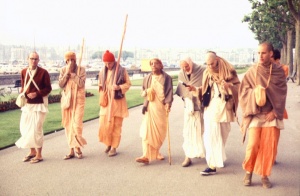SB 5.26.17: Difference between revisions
No edit summary |
(Vanibot #0054 edit - transform synonyms into clickable links, which search similar occurrences) |
||
| Line 26: | Line 26: | ||
<div class="synonyms"> | <div class="synonyms"> | ||
''yaḥ'' | ''[//vanipedia.org/wiki/Special:VaniSearch?s=yaḥ&tab=syno_o&ds=1 yaḥ]'' — any person who; ''[//vanipedia.org/wiki/Special:VaniSearch?s=tu&tab=syno_o&ds=1 tu]'' — but; ''[//vanipedia.org/wiki/Special:VaniSearch?s=iha&tab=syno_o&ds=1 iha]'' — in this life; ''[//vanipedia.org/wiki/Special:VaniSearch?s=vai&tab=syno_o&ds=1 vai]'' — indeed; ''[//vanipedia.org/wiki/Special:VaniSearch?s=bhūtānām&tab=syno_o&ds=1 bhūtānām]'' — to some living entities; ''[//vanipedia.org/wiki/Special:VaniSearch?s=īśvara&tab=syno_o&ds=1 īśvara]'' — by the supreme controller; ''[//vanipedia.org/wiki/Special:VaniSearch?s=upakalpita&tab=syno_o&ds=1 upakalpita]'' — designed; ''[//vanipedia.org/wiki/Special:VaniSearch?s=vṛttīnām&tab=syno_o&ds=1 vṛttīnām]'' — whose means of livelihood; ''[//vanipedia.org/wiki/Special:VaniSearch?s=avivikta&tab=syno_o&ds=1 avivikta]'' — not understanding; ''[//vanipedia.org/wiki/Special:VaniSearch?s=para&tab=syno_o&ds=1 para]-[//vanipedia.org/wiki/Special:VaniSearch?s=vyathānām&tab=syno_o&ds=1 vyathānām]'' — the pain of others; ''[//vanipedia.org/wiki/Special:VaniSearch?s=svayam&tab=syno_o&ds=1 svayam]'' — himself; ''[//vanipedia.org/wiki/Special:VaniSearch?s=puruṣa&tab=syno_o&ds=1 puruṣa]-[//vanipedia.org/wiki/Special:VaniSearch?s=upakalpita&tab=syno_o&ds=1 upakalpita]'' — designed by the Supreme Personality of Godhead; ''[//vanipedia.org/wiki/Special:VaniSearch?s=vṛttiḥ&tab=syno_o&ds=1 vṛttiḥ]'' — whose livelihood; ''[//vanipedia.org/wiki/Special:VaniSearch?s=vivikta&tab=syno_o&ds=1 vivikta]'' — understanding; ''[//vanipedia.org/wiki/Special:VaniSearch?s=para&tab=syno_o&ds=1 para]-[//vanipedia.org/wiki/Special:VaniSearch?s=vyathaḥ&tab=syno_o&ds=1 vyathaḥ]'' — the painful conditions of others; ''[//vanipedia.org/wiki/Special:VaniSearch?s=vyathām&tab=syno_o&ds=1 vyathām] [//vanipedia.org/wiki/Special:VaniSearch?s=ācarati&tab=syno_o&ds=1 ācarati]'' — but still causes pain; ''[//vanipedia.org/wiki/Special:VaniSearch?s=saḥ&tab=syno_o&ds=1 saḥ]'' — such a person; ''[//vanipedia.org/wiki/Special:VaniSearch?s=paratra&tab=syno_o&ds=1 paratra]'' — in his next life; ''[//vanipedia.org/wiki/Special:VaniSearch?s=andhakūpe&tab=syno_o&ds=1 andhakūpe]'' — to the hell named Andhakūpa; ''[//vanipedia.org/wiki/Special:VaniSearch?s=tat&tab=syno_o&ds=1 tat]'' — to them; ''[//vanipedia.org/wiki/Special:VaniSearch?s=abhidroheṇa&tab=syno_o&ds=1 abhidroheṇa]'' — by the sin of malice; ''[//vanipedia.org/wiki/Special:VaniSearch?s=nipatati&tab=syno_o&ds=1 nipatati]'' — falls down; ''[//vanipedia.org/wiki/Special:VaniSearch?s=tatra&tab=syno_o&ds=1 tatra]'' — there; ''[//vanipedia.org/wiki/Special:VaniSearch?s=ha&tab=syno_o&ds=1 ha]'' — indeed; ''[//vanipedia.org/wiki/Special:VaniSearch?s=asau&tab=syno_o&ds=1 asau]'' — that person; ''[//vanipedia.org/wiki/Special:VaniSearch?s=taiḥ&tab=syno_o&ds=1 taiḥ] [//vanipedia.org/wiki/Special:VaniSearch?s=jantubhiḥ&tab=syno_o&ds=1 jantubhiḥ]'' — by those respective living entities; ''[//vanipedia.org/wiki/Special:VaniSearch?s=paśu&tab=syno_o&ds=1 paśu]'' — animals; ''[//vanipedia.org/wiki/Special:VaniSearch?s=mṛga&tab=syno_o&ds=1 mṛga]'' — wild beasts; ''[//vanipedia.org/wiki/Special:VaniSearch?s=pakṣi&tab=syno_o&ds=1 pakṣi]'' — birds; ''[//vanipedia.org/wiki/Special:VaniSearch?s=sarīsṛpaiḥ&tab=syno_o&ds=1 sarīsṛpaiḥ]'' — snakes; ''[//vanipedia.org/wiki/Special:VaniSearch?s=maśaka&tab=syno_o&ds=1 maśaka]'' — mosquitoes; ''[//vanipedia.org/wiki/Special:VaniSearch?s=yūkā&tab=syno_o&ds=1 yūkā]'' — lice; ''[//vanipedia.org/wiki/Special:VaniSearch?s=matkuṇa&tab=syno_o&ds=1 matkuṇa]'' — worms; ''[//vanipedia.org/wiki/Special:VaniSearch?s=makṣika&tab=syno_o&ds=1 makṣika]-[//vanipedia.org/wiki/Special:VaniSearch?s=ādibhiḥ&tab=syno_o&ds=1 ādibhiḥ]'' — flies and so on; ''[//vanipedia.org/wiki/Special:VaniSearch?s=ye&tab=syno_o&ds=1 ye] [//vanipedia.org/wiki/Special:VaniSearch?s=ke&tab=syno_o&ds=1 ke]'' — whoever else; ''[//vanipedia.org/wiki/Special:VaniSearch?s=ca&tab=syno_o&ds=1 ca]'' — and; ''[//vanipedia.org/wiki/Special:VaniSearch?s=abhidrugdhāḥ&tab=syno_o&ds=1 abhidrugdhāḥ]'' — persecuted; ''[//vanipedia.org/wiki/Special:VaniSearch?s=taiḥ&tab=syno_o&ds=1 taiḥ]'' — by them; ''[//vanipedia.org/wiki/Special:VaniSearch?s=sarvataḥ&tab=syno_o&ds=1 sarvataḥ]'' — everywhere; ''[//vanipedia.org/wiki/Special:VaniSearch?s=abhidruhyamāṇaḥ&tab=syno_o&ds=1 abhidruhyamāṇaḥ]'' — being injured; ''[//vanipedia.org/wiki/Special:VaniSearch?s=tamasi&tab=syno_o&ds=1 tamasi]'' — in the darkness; ''[//vanipedia.org/wiki/Special:VaniSearch?s=vihata&tab=syno_o&ds=1 vihata]'' — disturbed; ''[//vanipedia.org/wiki/Special:VaniSearch?s=nidrā&tab=syno_o&ds=1 nidrā]-[//vanipedia.org/wiki/Special:VaniSearch?s=nirvṛtiḥ&tab=syno_o&ds=1 nirvṛtiḥ]'' — whose resting place; ''[//vanipedia.org/wiki/Special:VaniSearch?s=alabdha&tab=syno_o&ds=1 alabdha]'' — not being able to obtain; ''[//vanipedia.org/wiki/Special:VaniSearch?s=avasthānaḥ&tab=syno_o&ds=1 avasthānaḥ]'' — a resting place; ''[//vanipedia.org/wiki/Special:VaniSearch?s=parikrāmati&tab=syno_o&ds=1 parikrāmati]'' — wanders; ''[//vanipedia.org/wiki/Special:VaniSearch?s=yathā&tab=syno_o&ds=1 yathā]'' — just as; ''[//vanipedia.org/wiki/Special:VaniSearch?s=ku&tab=syno_o&ds=1 ku]-[//vanipedia.org/wiki/Special:VaniSearch?s=śarīre&tab=syno_o&ds=1 śarīre]'' — in a low-grade body; ''[//vanipedia.org/wiki/Special:VaniSearch?s=jīvaḥ&tab=syno_o&ds=1 jīvaḥ]'' — a living entity. | ||
</div> | </div> | ||
Latest revision as of 22:16, 18 February 2024

A.C. Bhaktivedanta Swami Prabhupada
TEXT 17
- yas tv iha vai bhūtānām īśvaropakalpita-vṛttīnām avivikta-para-vyathānāṁ
- svayaṁ puruṣopakalpita-vṛttir vivikta-para-vyatho vyathām
- ācarati sa paratrāndhakūpe tad-abhidroheṇa nipatati
- tatra hāsau tair jantubhiḥ paśu-mṛga-pakṣi-sarīsṛpair
- maśaka-yūkā-matkuṇa-makṣikādibhir ye ke cābhidrugdhās taiḥ
- sarvato 'bhidruhyamāṇas tamasi vihata-nidrā-nirvṛtir
- alabdhāvasthānaḥ parikrāmati yathā kuśarīre jīvaḥ
SYNONYMS
yaḥ — any person who; tu — but; iha — in this life; vai — indeed; bhūtānām — to some living entities; īśvara — by the supreme controller; upakalpita — designed; vṛttīnām — whose means of livelihood; avivikta — not understanding; para-vyathānām — the pain of others; svayam — himself; puruṣa-upakalpita — designed by the Supreme Personality of Godhead; vṛttiḥ — whose livelihood; vivikta — understanding; para-vyathaḥ — the painful conditions of others; vyathām ācarati — but still causes pain; saḥ — such a person; paratra — in his next life; andhakūpe — to the hell named Andhakūpa; tat — to them; abhidroheṇa — by the sin of malice; nipatati — falls down; tatra — there; ha — indeed; asau — that person; taiḥ jantubhiḥ — by those respective living entities; paśu — animals; mṛga — wild beasts; pakṣi — birds; sarīsṛpaiḥ — snakes; maśaka — mosquitoes; yūkā — lice; matkuṇa — worms; makṣika-ādibhiḥ — flies and so on; ye ke — whoever else; ca — and; abhidrugdhāḥ — persecuted; taiḥ — by them; sarvataḥ — everywhere; abhidruhyamāṇaḥ — being injured; tamasi — in the darkness; vihata — disturbed; nidrā-nirvṛtiḥ — whose resting place; alabdha — not being able to obtain; avasthānaḥ — a resting place; parikrāmati — wanders; yathā — just as; ku-śarīre — in a low-grade body; jīvaḥ — a living entity.
TRANSLATION
By the arrangement of the Supreme Lord, low-grade living beings like bugs and mosquitoes suck the blood of human beings and other animals. Such insignificant creatures are unaware that their bites are painful to the human being. However, first-class human beings—brāhmaṇas, kṣatriyas and vaiśyas—are developed in consciousness, and therefore they know how painful it is to be killed. A human being endowed with knowledge certainly commits sin if he kills or torments insignificant creatures, who have no discrimination. The Supreme Lord punishes such a man by putting him into the hell known as Andhakūpa, where he is attacked by all the birds and beasts, reptiles, mosquitoes, lice, worms, flies, and any other creatures he tormented during his life. They attack him from all sides, robbing him of the pleasure of sleep. Unable to rest, he constantly wanders about in the darkness. Thus in Andhakūpa his suffering is just like that of a creature in the lower species.
PURPORT
From this very instructive verse we learn that lower animals, created by the laws of nature to disturb the human being, are not subjected to punishment. Because the human being has developed consciousness, however, he cannot do anything against the principles of varṇāśrama-dharma without being condemned. Kṛṣṇa states in Bhagavad-gītā (BG 4.13), cātur-varṇyaṁ mayā sṛṣṭaṁ guṇa-karma-vibhāgaśaḥ: "According to the three modes of material nature and the work ascribed to them, the four divisions of human society were created by Me." Thus all men should be divided into four classes—''brāhmaṇas, kṣatriyas, vaiśyas and śūdras—and they should act according to their ordained regulations. They cannot deviate from their prescribed rules and regulations. One of these states that they should never trouble any animal, even those that disturb human beings. Although a tiger is not sinful if he attacks another animal and eats its flesh, if a man with developed consciousness does so, he must be punished. In other words, a human being who does not use his developed consciousness but instead acts like an animal surely undergoes punishment in many different hells.